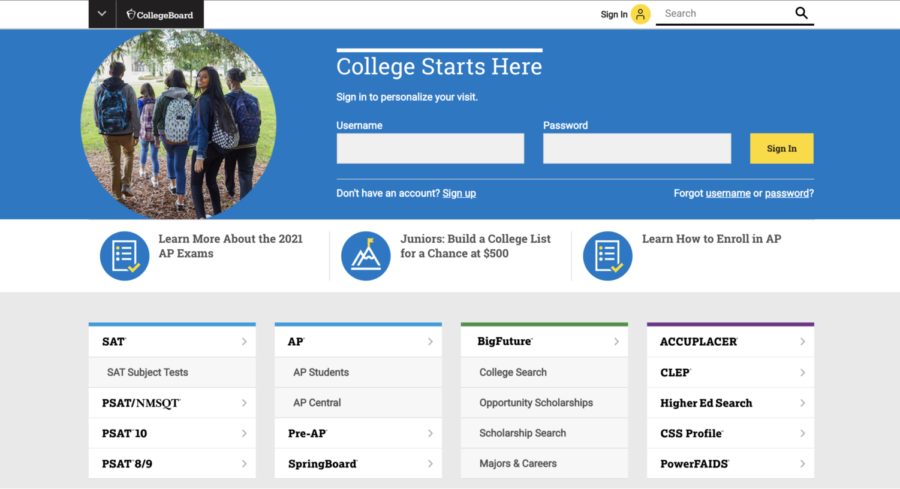College Board: The Monolith Must Come Down
College Board is the primary website students use to sign up to take standardized tests for college placement.
Our government and its institutions have a history of prioritizing profit over people, and College Board is no exception. Almost everywhere you turn, their brand infiltrates our education — from AP classes to the SATs to financial aid for college. College Board’s monopoly over education is not only harmful to students, but it also restricts teachers and furthers the socioeconomic divide.
Thanks to their partnerships with many well-known figures in the college preparatory industry such as Khan Academy, there are almost no major competitors for College Board. The company’s CEO, David Coleman, has also gone to great lengths to ensure this. In the early 2010s, when the ACT’s profits were beginning to rise noticeably above College Board’s, Coleman poached ACT employees to emulate their success and changed the SAT accordingly. Neither of these actions appear as though they are with students’ best interest in mind.
Because of College Board’s unprecedented influence, they are free to run unchecked. A notable example of this is the rising AP test costs, a burden that most high school students’ families will carry. Although the costs only rise a little each year, 1.2 million public high school students in the United States took 4.2 million AP exams in 2019, meaning that these small increases end up heavily impacting many students in the long run. The gradual dollar or two increase in costs is becoming too common, as College Board has raised the base price of AP exams by another dollar for 2021.
According to Forbes India, these tests “fuel more than 1 billion [dollars] in annual revenue and $100 million in untaxed surplus. It has 400 million [dollars] invested with hedge funds and private equity, and its chief executive, McKinsey-trained David Coleman, 50, pulls down compensation of almost 2 million [dollars] a year.”
This begs the question of whether AP tests are for the student’s benefit or the corporation’s. According to Consumer News and Business Channel (CNBC), “among top colleges, 86 percent restrict use of [AP] credits.”
Boston Latin School student Ross Mikulskis (I) says, “BLS offered to administer the SAT, so I felt like I had to since many of my classmates would be reporting scores.” With the current global pandemic, he also notes, “Pretty much all opportunities for taking the SAT were gone, so I am thankful to BLS for giving us a chance to take [it].”
Many students like Mikulskis feel pressured to take the test because in order to remain competitive for college admissions, AP classes and SAT scores are a must, even when most schools are test-optional. Test pricing or situation complaints turn into a luxury most students cannot afford.
The AP mission statement also claims that they “are a not-for-profit membership organization committed to excellence and equity in education.” Yet their “commitment” to education restricts teachers, whose performances are evaluated based on how well their students do on a single test graded from 1 to 5. Just last year, teachers cut important pieces from their classes so that they could better allocate time towards preparing students for their online AP exams. But are we really being prepared for college? Current curricula prove that APs are not good preparation for college, but instead, are just another way that College Board has taken over the high school education system.
Clearly, the so-called goal of excellence and equity in education is not being reached. AP classes and SAT testing, which are meant to aid and prepare students for college, only exist for College Board to profit from. The organization can only afford to do this because they have no competitors. If competitors such as the ACT, however, are able to grow more, College Board will no longer be able to change prices at will. It will then have to contemplate the consequences of a drop in test-takers, reducing their ability to monopolize higher education.







